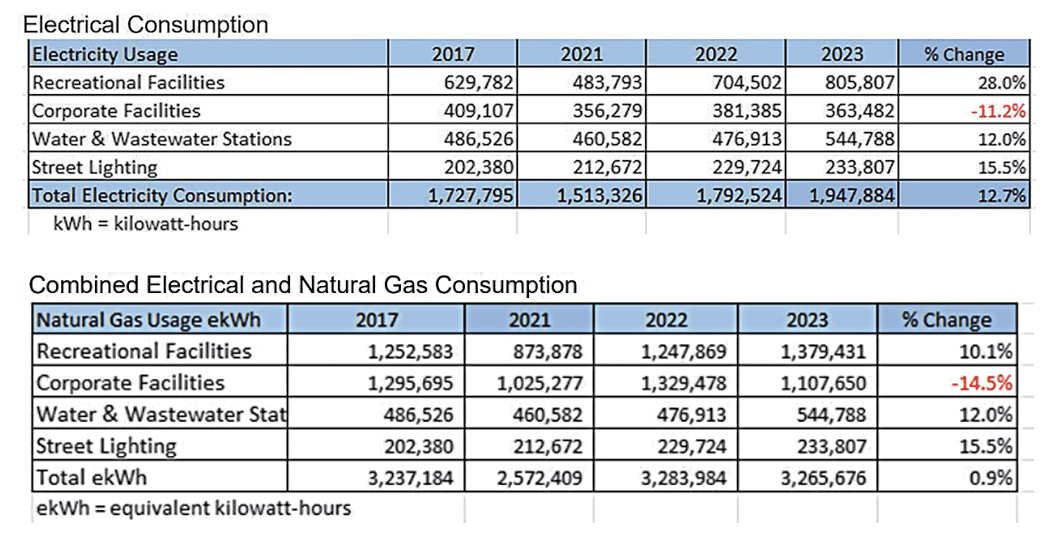MAPLETON – In 2019, Township of Mapleton staff set a goal to reduce energy consumption by two per cent annually from 2020 to 2025.
The township missed the mark on its goal, with overall energy consumption increasing instead, by about 1% over a six year period.
And in 2023, the township paid $488,149 in utility costs. – 16.5% more than in 2017.
That’s according to a report presented by Mapleton financial analyst Heather Trottier on July 9.
Trottier said the increased utility costs are mostly due to rate increases.
The report attributes the increase in energy usage to growth, including adding the ABC Splash Pad Park, a new water tower in Drayton, and additional street lighting.
Mapleton recreational facilities used 28% more energy in 2023 than in 2017, water and wastewater energy usage increased by 12% in this time, and energy used for street lighting increased by 16%.
Trottier said “honestly there’s nothing we can do” about the increase for street lighting, as “that is not even metred … we are billed per unit. So as we add services we are going to get more kilowatts there.”
And although the total energy used for pumping water and wastewater has increased, the amount of energy used per billion litres of water is gradually decreasing, Trottier said, noting, “We’re pumping water more efficiently.”
When considering the amount of energy used per litre pumped, instead of the energy used overall, Trottier said “we’re very close to that goal of 2%” reduction, as the facilities show an almost 12% decrease in energy use per litre of water pumped between 2017 and 2023.
The report attributes this decrease to updating equipment at water and wastewater facilities.
At the township’s corporate facilities, energy consumption decreased by 11% from 2017 to 2023. Trottier said part of the reason for that is “we got rid of the Maryborough road shop.”
The PMD arena uses a significant amount of energy annually, and the amount of energy the arena uses has been increasing each year, Trottier noted. “We should be looking at why that is.”
For natural gas use, the township its meeting its goal of 2% reduction per year, with its natural gas usage decreasing by 12% since 2017.
The township has entered into a retainer agreement with Local Authority Services to secure a stable commodity rate for gas usage, the report states.

The Township of Mapleton did not meet its target to reduce energy consumption annually by 2%. Financial analyst Heather Trottier said the decreases in consumption in 2021 were a result of the COVID-19 pandemic. She presented an energy consumption report and updated energy management plan to council on June 9. Tables from Mapleton energy consumption report
Conservation management
“By evaluating consumption trends, asking the right questions, and making smart procurement choices, we should be able to further reduce our energy consumption and reduce greenhouse gas emissions,” the report states.
An energy management professional, shared between Mapleton and Centre Wellington, will support the townships in managing energy use moving forward.
“I think that is going to be really beneficial for us,” Trottier said. “Centre Wellington is about the same size and has lots of the same service points. So I think a lot of the work that they do over there we will be able to look at and see what can we do over here that would be similar.”
In 2023 Mapleton formed an environmental advisory committee to help analyze data and implement changes, something the report states “shows council’s commitment to lowering our greenhouse gas emissions.”
“We also have our building condition assessment report,” Trottier said. “I think that would be a really good tool as well, to take a look at some of the equipment that might be a little bit older and might be up for making more efficient in our building facilities.”
Council approved an updated energy conservation and demand management plan presented by Trottier during the same meeting.
The plan is updated every five years and its intent is to “improve understanding and reporting of energy consumption, help benchmark, encourage energy conservation and demand management activities … and eventually make this information available to the public,” a report about the plan states.
“We are committed to creating new partnerships and working with other organizations to better manage energy use across our community,” the plan states.
It lists the following goals, objectives and targets:
– exemplify energy conservation stewardship and leadership;
– continuously improve the energy efficiency of facilities and processes to reduce operating costs, energy consumption, and the associated greenhouse gas emissions;
– monitor, evaluate, and measure corporate energy use;
– enhance overall staff understanding of energy and water consumption;
– consider energy efficiency in the procurement process of equipment upgrades and capital spending;
– reduce consumption in all recreation and corporate municipal buildings by an average of 2% per year between now and 2029; and
– decrease consumption levels per litre pumped in our water and wastewater facilities by an average of 2% per year between now and 2029.
Councillor Michael Martin said he “enjoyed seeing the recommendations around efficiencies and energy and water.
“I know that this township has historically exercised our ability to increase rates in the name of conservation, and I know in the short term it does seem to have an effect, but in the long term things seem to right themselves.
“Just increasing the rates on water and wastewater longterm doesn’t seem like a real efficient strategy.
“So to be employing other strategies … around efficiencies and how we do business seems to be a great strategy.”



